HRM560 Report: Improving Overseas Student Employability Skills
VerifiedAdded on 2022/09/23
|13
|2798
|25
Report
AI Summary
This report addresses the need for a training program to enhance the employability skills of overseas students seeking casual work in Australia. It begins by emphasizing the importance of employability skills in the modern business environment, particularly for students balancing work and studies. The report details a needs assessment approach, advocating for individual interviews and focus groups to gather information about students' developmental needs, recognizing the importance of building rapport with participants to encourage open communication. It then explores various training methods, with a preference for online training modules due to their flexibility and accessibility, incorporating video tutorials and digital communication for feedback. Finally, the report presents a structured training plan focusing on improving communication and ethical business practices, including video tutorials, group discussions, and feedback mechanisms to facilitate skill development. The report concludes by highlighting the college's ability to provide effective training in these crucial areas.
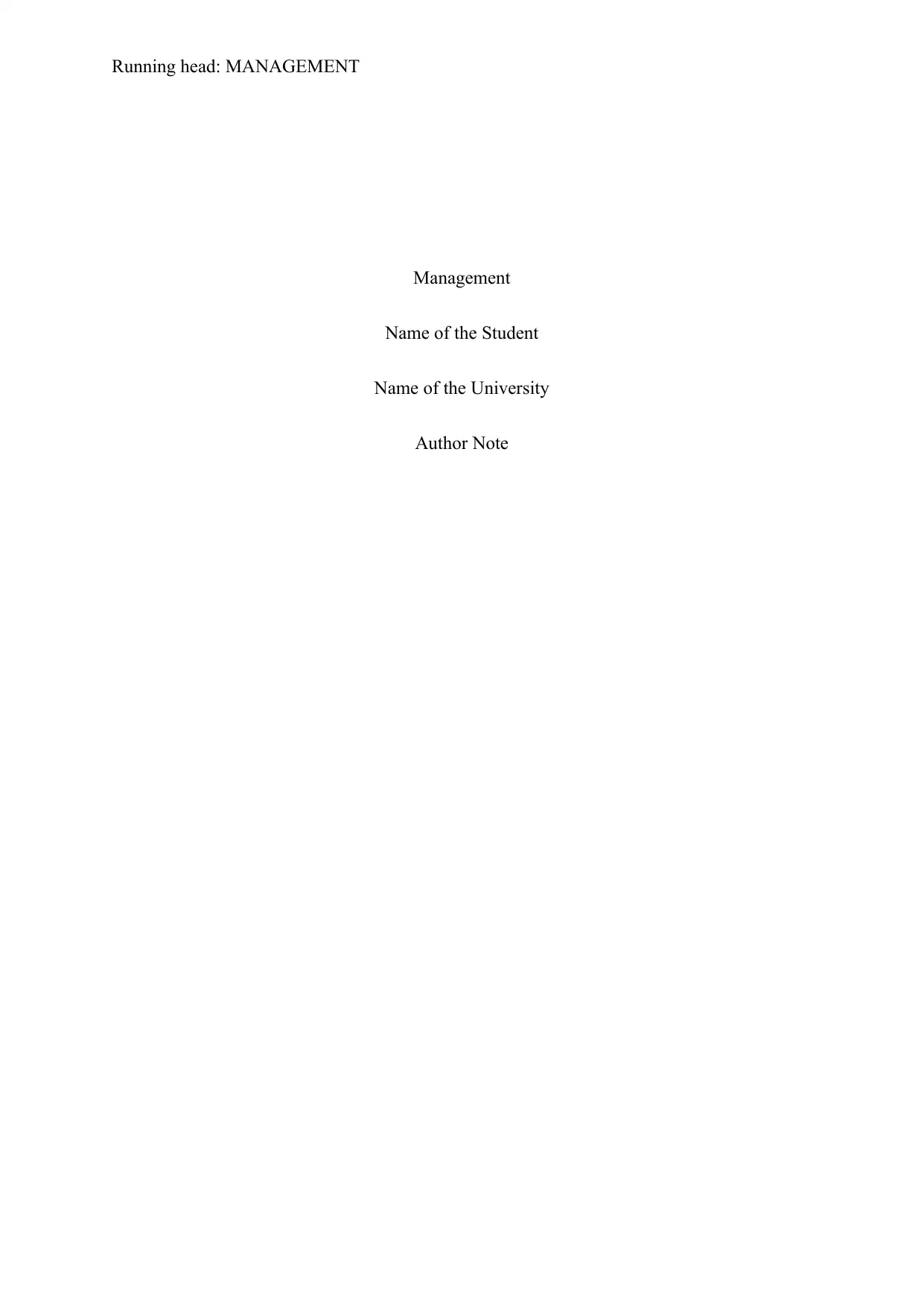
Running head: MANAGEMENT
Management
Name of the Student
Name of the University
Author Note
Management
Name of the Student
Name of the University
Author Note
Paraphrase This Document
Need a fresh take? Get an instant paraphrase of this document with our AI Paraphraser
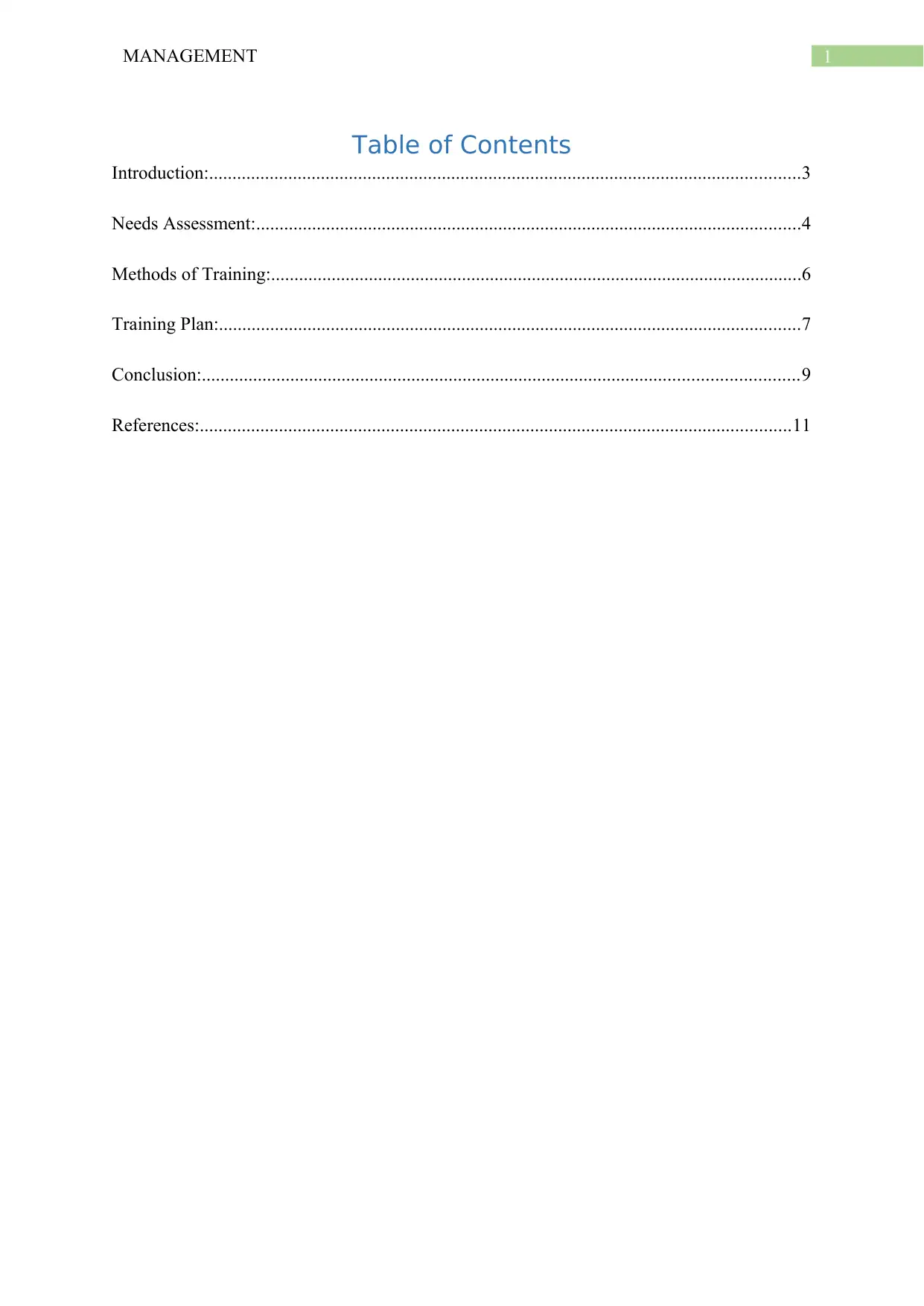
1MANAGEMENT
Table of Contents
Introduction:...............................................................................................................................3
Needs Assessment:.....................................................................................................................4
Methods of Training:..................................................................................................................6
Training Plan:.............................................................................................................................7
Conclusion:................................................................................................................................9
References:...............................................................................................................................11
Table of Contents
Introduction:...............................................................................................................................3
Needs Assessment:.....................................................................................................................4
Methods of Training:..................................................................................................................6
Training Plan:.............................................................................................................................7
Conclusion:................................................................................................................................9
References:...............................................................................................................................11
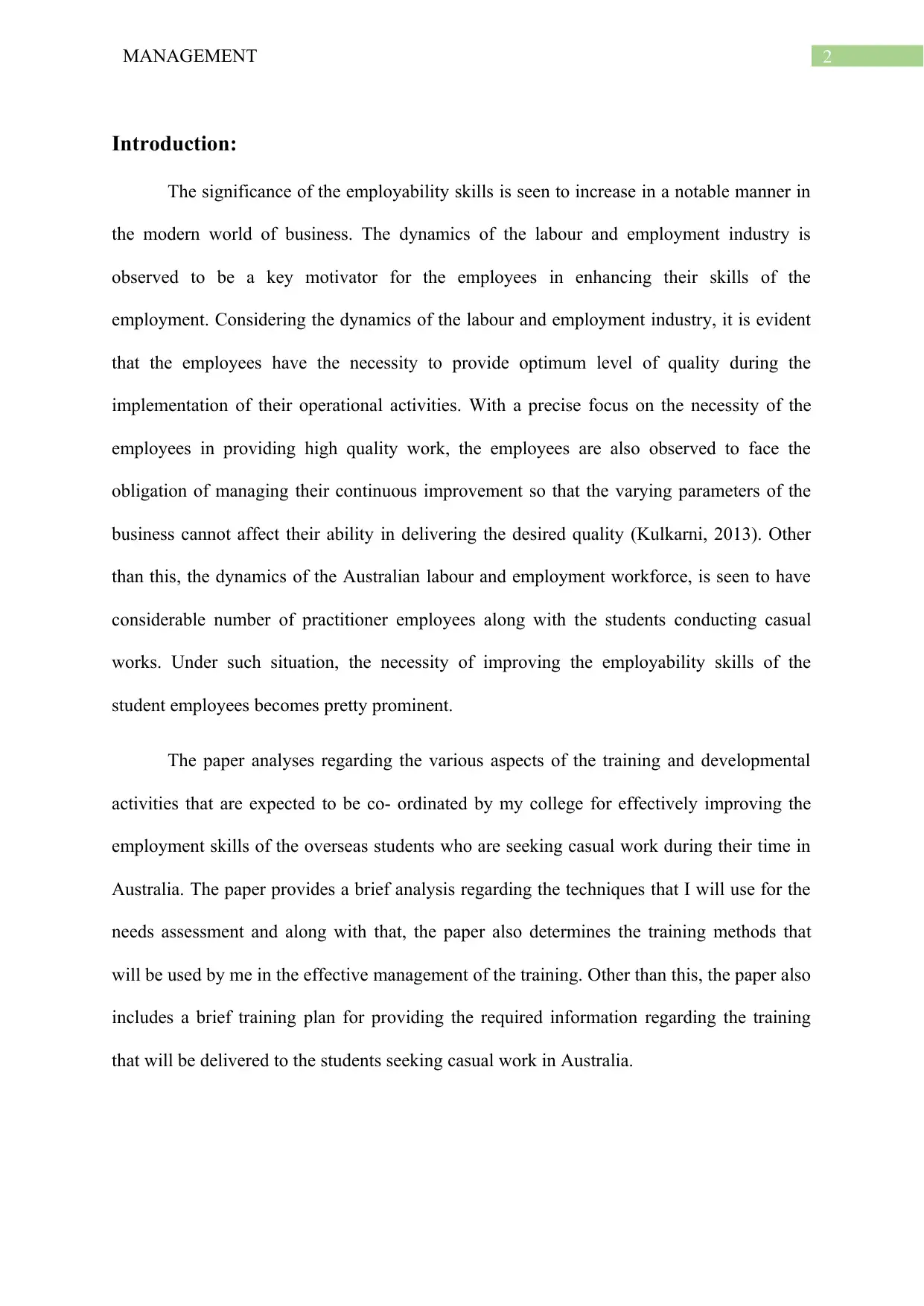
2MANAGEMENT
Introduction:
The significance of the employability skills is seen to increase in a notable manner in
the modern world of business. The dynamics of the labour and employment industry is
observed to be a key motivator for the employees in enhancing their skills of the
employment. Considering the dynamics of the labour and employment industry, it is evident
that the employees have the necessity to provide optimum level of quality during the
implementation of their operational activities. With a precise focus on the necessity of the
employees in providing high quality work, the employees are also observed to face the
obligation of managing their continuous improvement so that the varying parameters of the
business cannot affect their ability in delivering the desired quality (Kulkarni, 2013). Other
than this, the dynamics of the Australian labour and employment workforce, is seen to have
considerable number of practitioner employees along with the students conducting casual
works. Under such situation, the necessity of improving the employability skills of the
student employees becomes pretty prominent.
The paper analyses regarding the various aspects of the training and developmental
activities that are expected to be co- ordinated by my college for effectively improving the
employment skills of the overseas students who are seeking casual work during their time in
Australia. The paper provides a brief analysis regarding the techniques that I will use for the
needs assessment and along with that, the paper also determines the training methods that
will be used by me in the effective management of the training. Other than this, the paper also
includes a brief training plan for providing the required information regarding the training
that will be delivered to the students seeking casual work in Australia.
Introduction:
The significance of the employability skills is seen to increase in a notable manner in
the modern world of business. The dynamics of the labour and employment industry is
observed to be a key motivator for the employees in enhancing their skills of the
employment. Considering the dynamics of the labour and employment industry, it is evident
that the employees have the necessity to provide optimum level of quality during the
implementation of their operational activities. With a precise focus on the necessity of the
employees in providing high quality work, the employees are also observed to face the
obligation of managing their continuous improvement so that the varying parameters of the
business cannot affect their ability in delivering the desired quality (Kulkarni, 2013). Other
than this, the dynamics of the Australian labour and employment workforce, is seen to have
considerable number of practitioner employees along with the students conducting casual
works. Under such situation, the necessity of improving the employability skills of the
student employees becomes pretty prominent.
The paper analyses regarding the various aspects of the training and developmental
activities that are expected to be co- ordinated by my college for effectively improving the
employment skills of the overseas students who are seeking casual work during their time in
Australia. The paper provides a brief analysis regarding the techniques that I will use for the
needs assessment and along with that, the paper also determines the training methods that
will be used by me in the effective management of the training. Other than this, the paper also
includes a brief training plan for providing the required information regarding the training
that will be delivered to the students seeking casual work in Australia.
⊘ This is a preview!⊘
Do you want full access?
Subscribe today to unlock all pages.

Trusted by 1+ million students worldwide
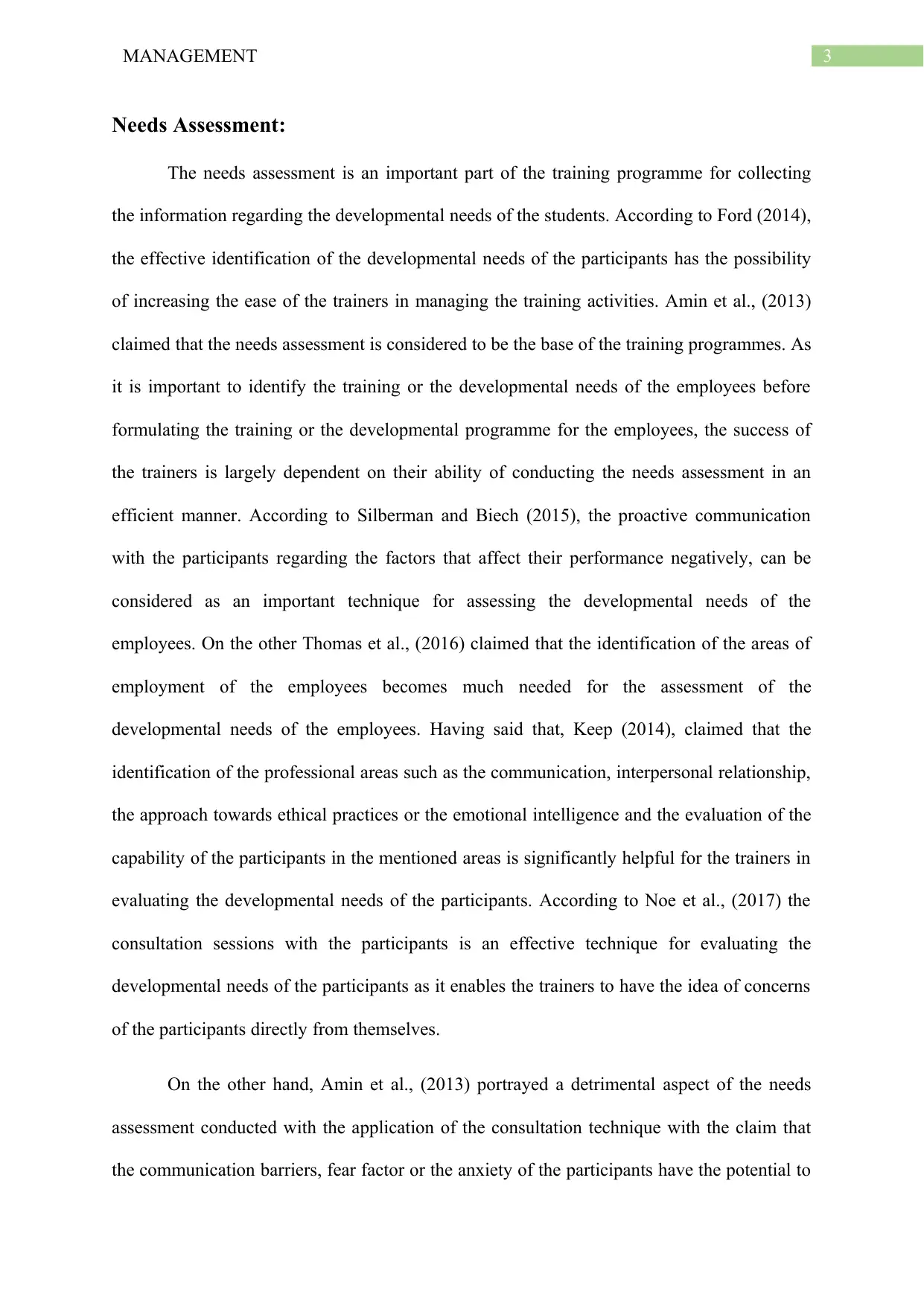
3MANAGEMENT
Needs Assessment:
The needs assessment is an important part of the training programme for collecting
the information regarding the developmental needs of the students. According to Ford (2014),
the effective identification of the developmental needs of the participants has the possibility
of increasing the ease of the trainers in managing the training activities. Amin et al., (2013)
claimed that the needs assessment is considered to be the base of the training programmes. As
it is important to identify the training or the developmental needs of the employees before
formulating the training or the developmental programme for the employees, the success of
the trainers is largely dependent on their ability of conducting the needs assessment in an
efficient manner. According to Silberman and Biech (2015), the proactive communication
with the participants regarding the factors that affect their performance negatively, can be
considered as an important technique for assessing the developmental needs of the
employees. On the other Thomas et al., (2016) claimed that the identification of the areas of
employment of the employees becomes much needed for the assessment of the
developmental needs of the employees. Having said that, Keep (2014), claimed that the
identification of the professional areas such as the communication, interpersonal relationship,
the approach towards ethical practices or the emotional intelligence and the evaluation of the
capability of the participants in the mentioned areas is significantly helpful for the trainers in
evaluating the developmental needs of the participants. According to Noe et al., (2017) the
consultation sessions with the participants is an effective technique for evaluating the
developmental needs of the participants as it enables the trainers to have the idea of concerns
of the participants directly from themselves.
On the other hand, Amin et al., (2013) portrayed a detrimental aspect of the needs
assessment conducted with the application of the consultation technique with the claim that
the communication barriers, fear factor or the anxiety of the participants have the potential to
Needs Assessment:
The needs assessment is an important part of the training programme for collecting
the information regarding the developmental needs of the students. According to Ford (2014),
the effective identification of the developmental needs of the participants has the possibility
of increasing the ease of the trainers in managing the training activities. Amin et al., (2013)
claimed that the needs assessment is considered to be the base of the training programmes. As
it is important to identify the training or the developmental needs of the employees before
formulating the training or the developmental programme for the employees, the success of
the trainers is largely dependent on their ability of conducting the needs assessment in an
efficient manner. According to Silberman and Biech (2015), the proactive communication
with the participants regarding the factors that affect their performance negatively, can be
considered as an important technique for assessing the developmental needs of the
employees. On the other Thomas et al., (2016) claimed that the identification of the areas of
employment of the employees becomes much needed for the assessment of the
developmental needs of the employees. Having said that, Keep (2014), claimed that the
identification of the professional areas such as the communication, interpersonal relationship,
the approach towards ethical practices or the emotional intelligence and the evaluation of the
capability of the participants in the mentioned areas is significantly helpful for the trainers in
evaluating the developmental needs of the participants. According to Noe et al., (2017) the
consultation sessions with the participants is an effective technique for evaluating the
developmental needs of the participants as it enables the trainers to have the idea of concerns
of the participants directly from themselves.
On the other hand, Amin et al., (2013) portrayed a detrimental aspect of the needs
assessment conducted with the application of the consultation technique with the claim that
the communication barriers, fear factor or the anxiety of the participants have the potential to
Paraphrase This Document
Need a fresh take? Get an instant paraphrase of this document with our AI Paraphraser
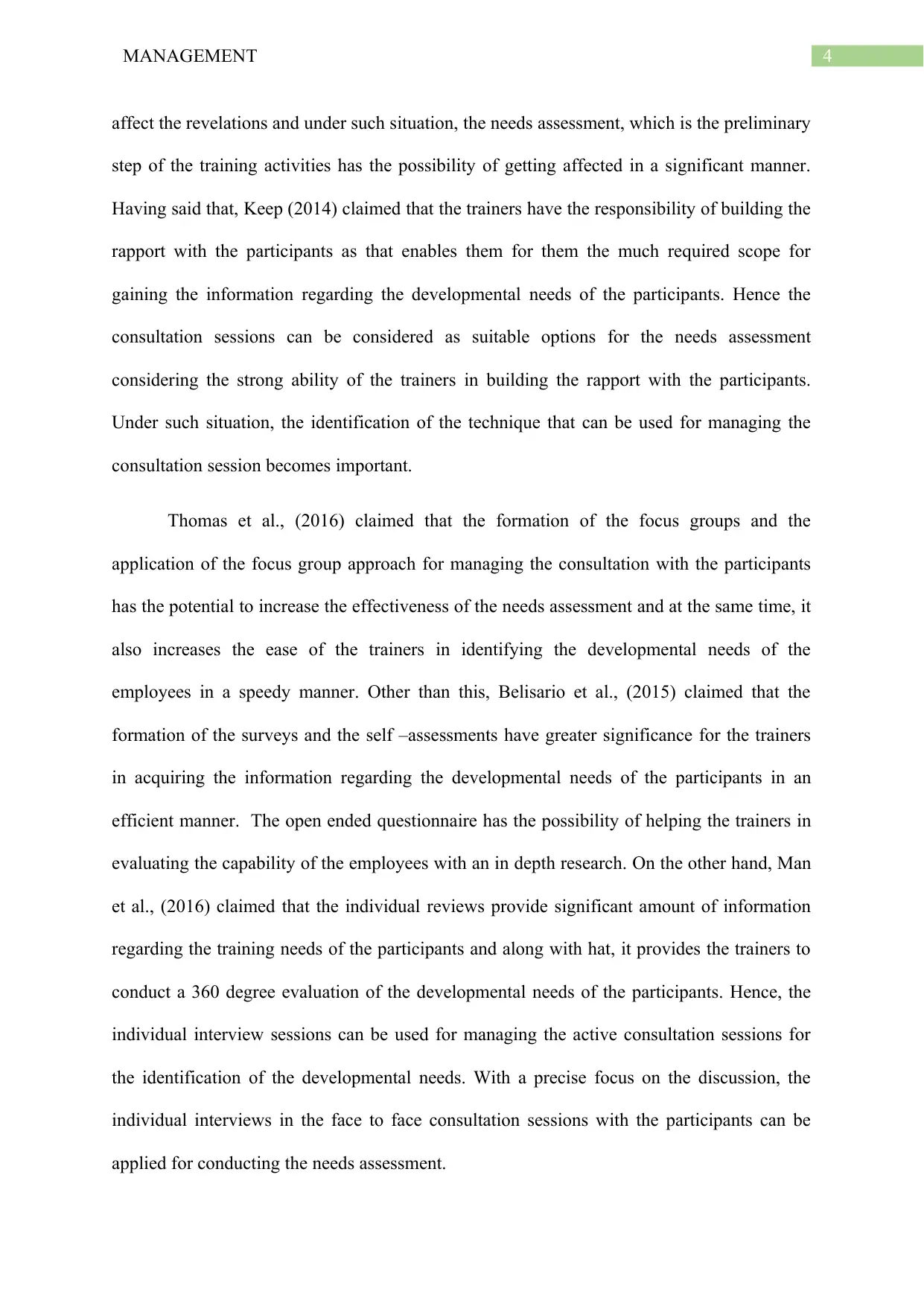
4MANAGEMENT
affect the revelations and under such situation, the needs assessment, which is the preliminary
step of the training activities has the possibility of getting affected in a significant manner.
Having said that, Keep (2014) claimed that the trainers have the responsibility of building the
rapport with the participants as that enables them for them the much required scope for
gaining the information regarding the developmental needs of the participants. Hence the
consultation sessions can be considered as suitable options for the needs assessment
considering the strong ability of the trainers in building the rapport with the participants.
Under such situation, the identification of the technique that can be used for managing the
consultation session becomes important.
Thomas et al., (2016) claimed that the formation of the focus groups and the
application of the focus group approach for managing the consultation with the participants
has the potential to increase the effectiveness of the needs assessment and at the same time, it
also increases the ease of the trainers in identifying the developmental needs of the
employees in a speedy manner. Other than this, Belisario et al., (2015) claimed that the
formation of the surveys and the self –assessments have greater significance for the trainers
in acquiring the information regarding the developmental needs of the participants in an
efficient manner. The open ended questionnaire has the possibility of helping the trainers in
evaluating the capability of the employees with an in depth research. On the other hand, Man
et al., (2016) claimed that the individual reviews provide significant amount of information
regarding the training needs of the participants and along with hat, it provides the trainers to
conduct a 360 degree evaluation of the developmental needs of the participants. Hence, the
individual interview sessions can be used for managing the active consultation sessions for
the identification of the developmental needs. With a precise focus on the discussion, the
individual interviews in the face to face consultation sessions with the participants can be
applied for conducting the needs assessment.
affect the revelations and under such situation, the needs assessment, which is the preliminary
step of the training activities has the possibility of getting affected in a significant manner.
Having said that, Keep (2014) claimed that the trainers have the responsibility of building the
rapport with the participants as that enables them for them the much required scope for
gaining the information regarding the developmental needs of the participants. Hence the
consultation sessions can be considered as suitable options for the needs assessment
considering the strong ability of the trainers in building the rapport with the participants.
Under such situation, the identification of the technique that can be used for managing the
consultation session becomes important.
Thomas et al., (2016) claimed that the formation of the focus groups and the
application of the focus group approach for managing the consultation with the participants
has the potential to increase the effectiveness of the needs assessment and at the same time, it
also increases the ease of the trainers in identifying the developmental needs of the
employees in a speedy manner. Other than this, Belisario et al., (2015) claimed that the
formation of the surveys and the self –assessments have greater significance for the trainers
in acquiring the information regarding the developmental needs of the participants in an
efficient manner. The open ended questionnaire has the possibility of helping the trainers in
evaluating the capability of the employees with an in depth research. On the other hand, Man
et al., (2016) claimed that the individual reviews provide significant amount of information
regarding the training needs of the participants and along with hat, it provides the trainers to
conduct a 360 degree evaluation of the developmental needs of the participants. Hence, the
individual interview sessions can be used for managing the active consultation sessions for
the identification of the developmental needs. With a precise focus on the discussion, the
individual interviews in the face to face consultation sessions with the participants can be
applied for conducting the needs assessment.
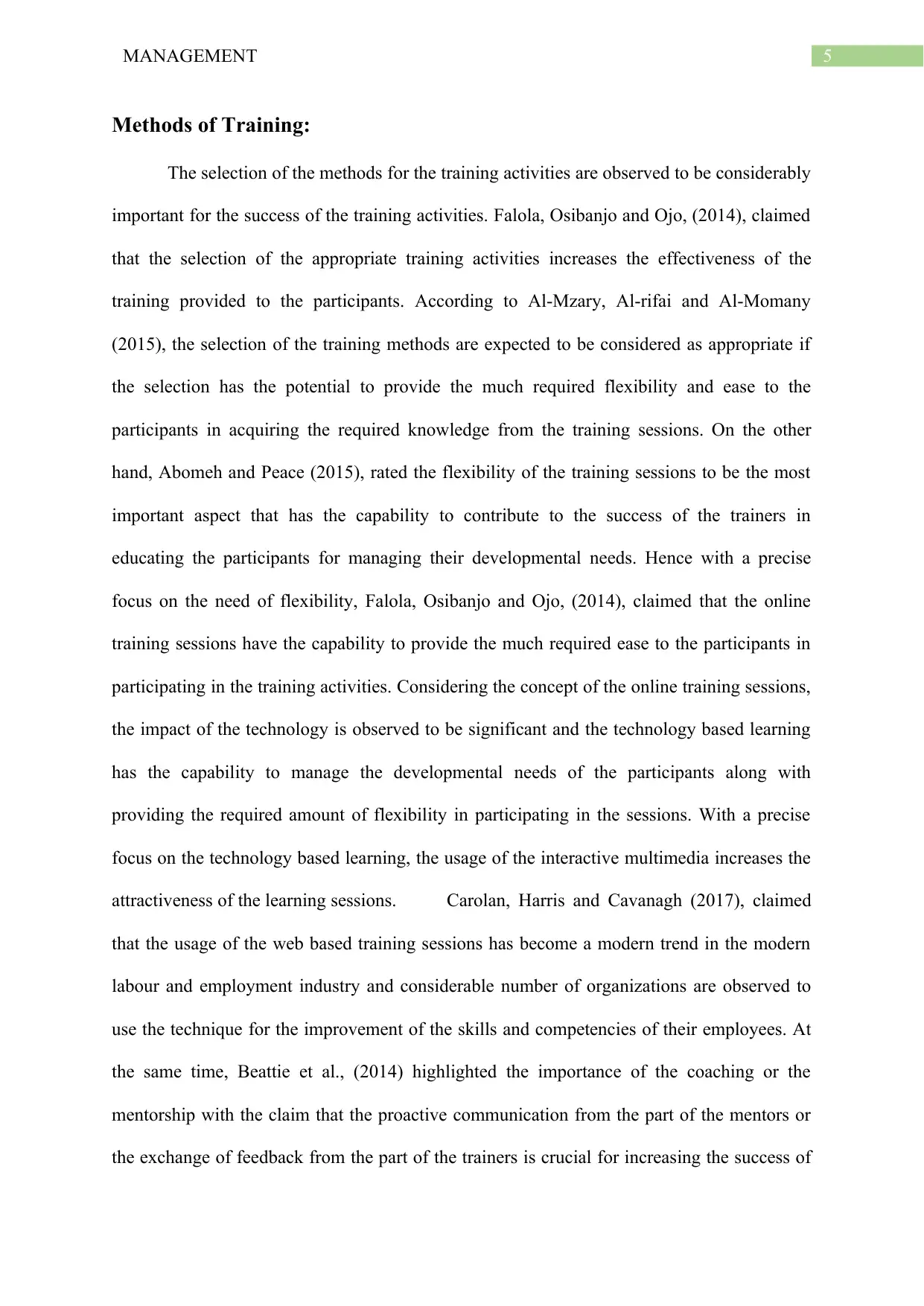
5MANAGEMENT
Methods of Training:
The selection of the methods for the training activities are observed to be considerably
important for the success of the training activities. Falola, Osibanjo and Ojo, (2014), claimed
that the selection of the appropriate training activities increases the effectiveness of the
training provided to the participants. According to Al-Mzary, Al-rifai and Al-Momany
(2015), the selection of the training methods are expected to be considered as appropriate if
the selection has the potential to provide the much required flexibility and ease to the
participants in acquiring the required knowledge from the training sessions. On the other
hand, Abomeh and Peace (2015), rated the flexibility of the training sessions to be the most
important aspect that has the capability to contribute to the success of the trainers in
educating the participants for managing their developmental needs. Hence with a precise
focus on the need of flexibility, Falola, Osibanjo and Ojo, (2014), claimed that the online
training sessions have the capability to provide the much required ease to the participants in
participating in the training activities. Considering the concept of the online training sessions,
the impact of the technology is observed to be significant and the technology based learning
has the capability to manage the developmental needs of the participants along with
providing the required amount of flexibility in participating in the sessions. With a precise
focus on the technology based learning, the usage of the interactive multimedia increases the
attractiveness of the learning sessions. Carolan, Harris and Cavanagh (2017), claimed
that the usage of the web based training sessions has become a modern trend in the modern
labour and employment industry and considerable number of organizations are observed to
use the technique for the improvement of the skills and competencies of their employees. At
the same time, Beattie et al., (2014) highlighted the importance of the coaching or the
mentorship with the claim that the proactive communication from the part of the mentors or
the exchange of feedback from the part of the trainers is crucial for increasing the success of
Methods of Training:
The selection of the methods for the training activities are observed to be considerably
important for the success of the training activities. Falola, Osibanjo and Ojo, (2014), claimed
that the selection of the appropriate training activities increases the effectiveness of the
training provided to the participants. According to Al-Mzary, Al-rifai and Al-Momany
(2015), the selection of the training methods are expected to be considered as appropriate if
the selection has the potential to provide the much required flexibility and ease to the
participants in acquiring the required knowledge from the training sessions. On the other
hand, Abomeh and Peace (2015), rated the flexibility of the training sessions to be the most
important aspect that has the capability to contribute to the success of the trainers in
educating the participants for managing their developmental needs. Hence with a precise
focus on the need of flexibility, Falola, Osibanjo and Ojo, (2014), claimed that the online
training sessions have the capability to provide the much required ease to the participants in
participating in the training activities. Considering the concept of the online training sessions,
the impact of the technology is observed to be significant and the technology based learning
has the capability to manage the developmental needs of the participants along with
providing the required amount of flexibility in participating in the sessions. With a precise
focus on the technology based learning, the usage of the interactive multimedia increases the
attractiveness of the learning sessions. Carolan, Harris and Cavanagh (2017), claimed
that the usage of the web based training sessions has become a modern trend in the modern
labour and employment industry and considerable number of organizations are observed to
use the technique for the improvement of the skills and competencies of their employees. At
the same time, Beattie et al., (2014) highlighted the importance of the coaching or the
mentorship with the claim that the proactive communication from the part of the mentors or
the exchange of feedback from the part of the trainers is crucial for increasing the success of
⊘ This is a preview!⊘
Do you want full access?
Subscribe today to unlock all pages.

Trusted by 1+ million students worldwide
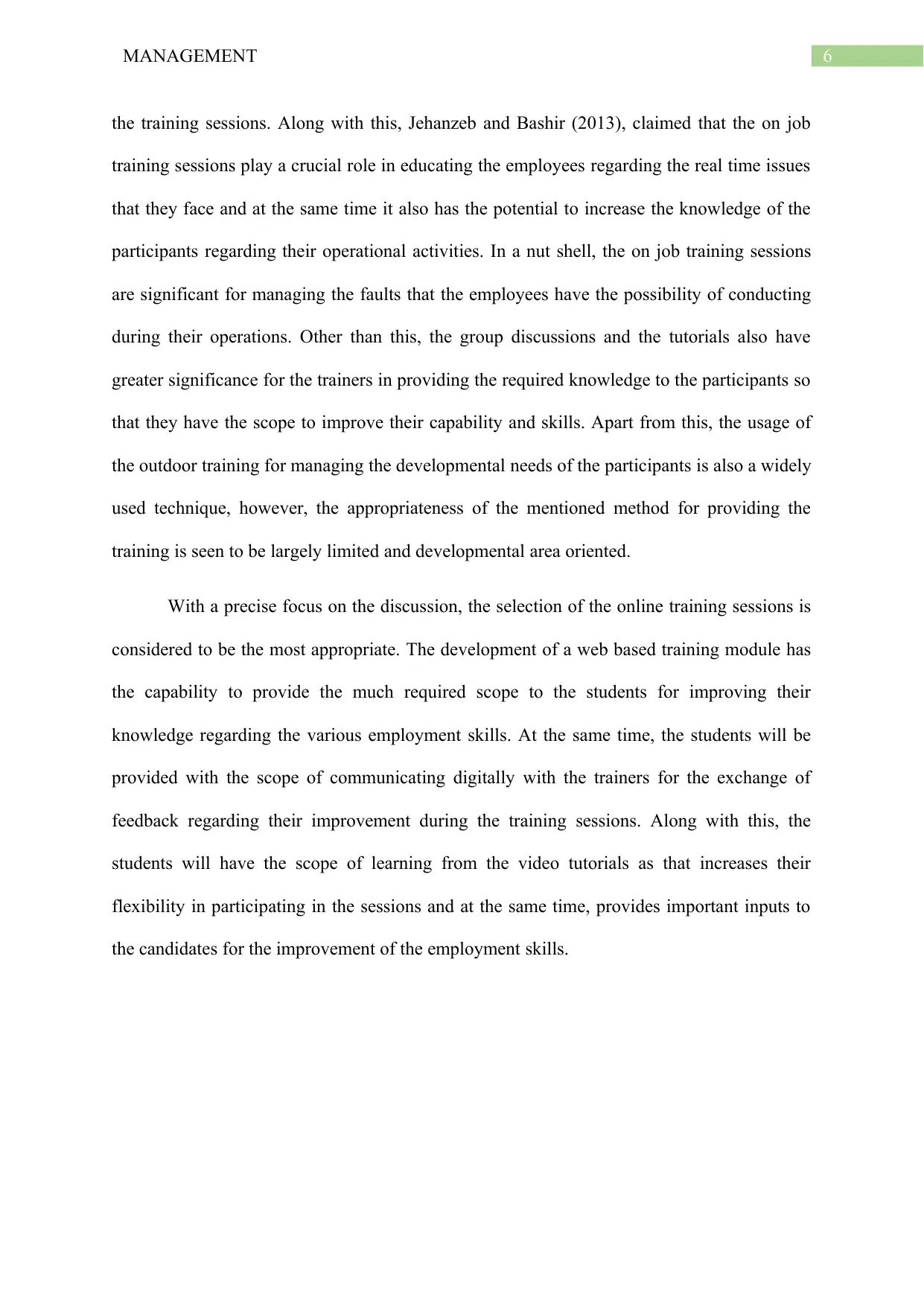
6MANAGEMENT
the training sessions. Along with this, Jehanzeb and Bashir (2013), claimed that the on job
training sessions play a crucial role in educating the employees regarding the real time issues
that they face and at the same time it also has the potential to increase the knowledge of the
participants regarding their operational activities. In a nut shell, the on job training sessions
are significant for managing the faults that the employees have the possibility of conducting
during their operations. Other than this, the group discussions and the tutorials also have
greater significance for the trainers in providing the required knowledge to the participants so
that they have the scope to improve their capability and skills. Apart from this, the usage of
the outdoor training for managing the developmental needs of the participants is also a widely
used technique, however, the appropriateness of the mentioned method for providing the
training is seen to be largely limited and developmental area oriented.
With a precise focus on the discussion, the selection of the online training sessions is
considered to be the most appropriate. The development of a web based training module has
the capability to provide the much required scope to the students for improving their
knowledge regarding the various employment skills. At the same time, the students will be
provided with the scope of communicating digitally with the trainers for the exchange of
feedback regarding their improvement during the training sessions. Along with this, the
students will have the scope of learning from the video tutorials as that increases their
flexibility in participating in the sessions and at the same time, provides important inputs to
the candidates for the improvement of the employment skills.
the training sessions. Along with this, Jehanzeb and Bashir (2013), claimed that the on job
training sessions play a crucial role in educating the employees regarding the real time issues
that they face and at the same time it also has the potential to increase the knowledge of the
participants regarding their operational activities. In a nut shell, the on job training sessions
are significant for managing the faults that the employees have the possibility of conducting
during their operations. Other than this, the group discussions and the tutorials also have
greater significance for the trainers in providing the required knowledge to the participants so
that they have the scope to improve their capability and skills. Apart from this, the usage of
the outdoor training for managing the developmental needs of the participants is also a widely
used technique, however, the appropriateness of the mentioned method for providing the
training is seen to be largely limited and developmental area oriented.
With a precise focus on the discussion, the selection of the online training sessions is
considered to be the most appropriate. The development of a web based training module has
the capability to provide the much required scope to the students for improving their
knowledge regarding the various employment skills. At the same time, the students will be
provided with the scope of communicating digitally with the trainers for the exchange of
feedback regarding their improvement during the training sessions. Along with this, the
students will have the scope of learning from the video tutorials as that increases their
flexibility in participating in the sessions and at the same time, provides important inputs to
the candidates for the improvement of the employment skills.
Paraphrase This Document
Need a fresh take? Get an instant paraphrase of this document with our AI Paraphraser
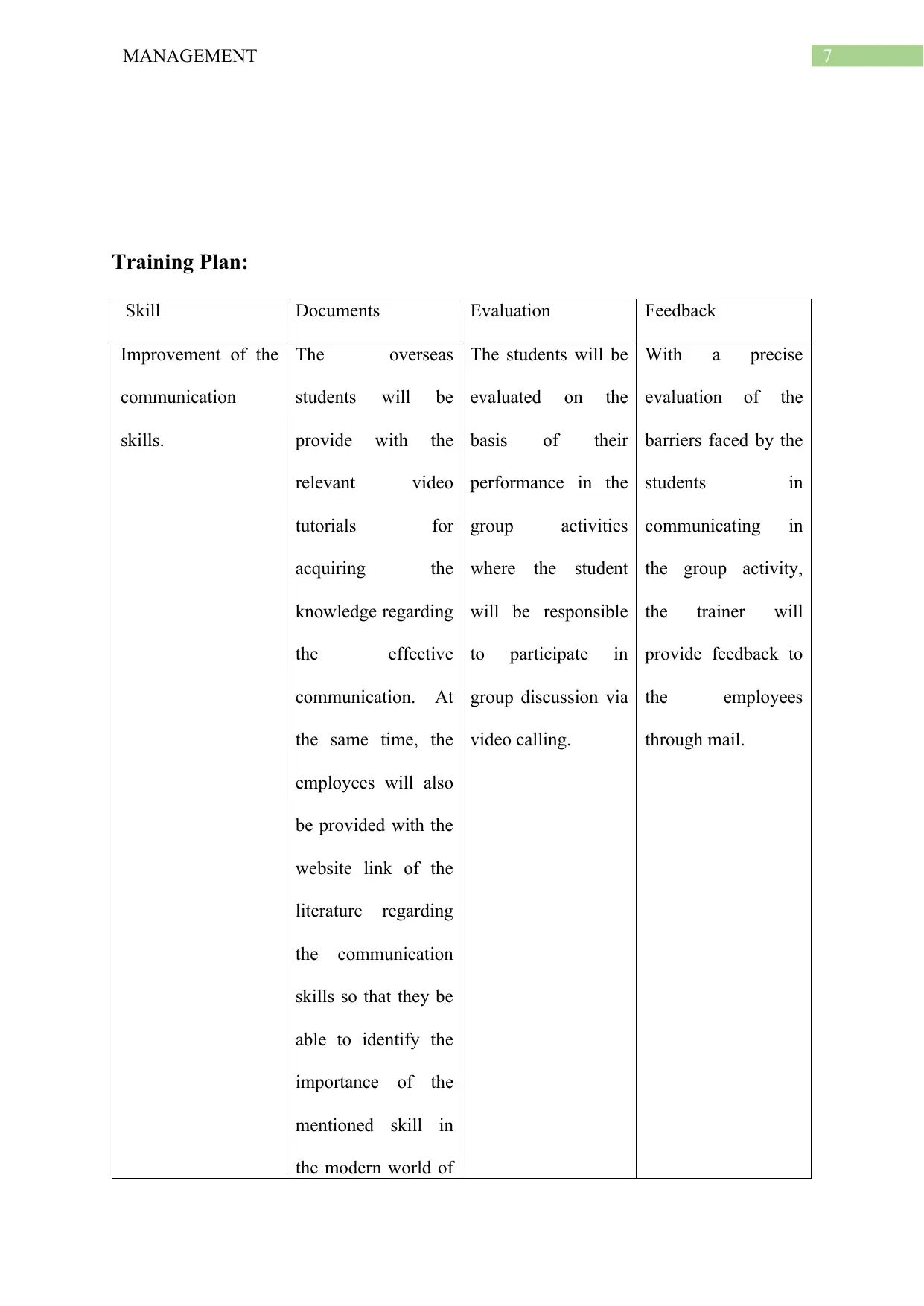
7MANAGEMENT
Training Plan:
Skill Documents Evaluation Feedback
Improvement of the
communication
skills.
The overseas
students will be
provide with the
relevant video
tutorials for
acquiring the
knowledge regarding
the effective
communication. At
the same time, the
employees will also
be provided with the
website link of the
literature regarding
the communication
skills so that they be
able to identify the
importance of the
mentioned skill in
the modern world of
The students will be
evaluated on the
basis of their
performance in the
group activities
where the student
will be responsible
to participate in
group discussion via
video calling.
With a precise
evaluation of the
barriers faced by the
students in
communicating in
the group activity,
the trainer will
provide feedback to
the employees
through mail.
Training Plan:
Skill Documents Evaluation Feedback
Improvement of the
communication
skills.
The overseas
students will be
provide with the
relevant video
tutorials for
acquiring the
knowledge regarding
the effective
communication. At
the same time, the
employees will also
be provided with the
website link of the
literature regarding
the communication
skills so that they be
able to identify the
importance of the
mentioned skill in
the modern world of
The students will be
evaluated on the
basis of their
performance in the
group activities
where the student
will be responsible
to participate in
group discussion via
video calling.
With a precise
evaluation of the
barriers faced by the
students in
communicating in
the group activity,
the trainer will
provide feedback to
the employees
through mail.
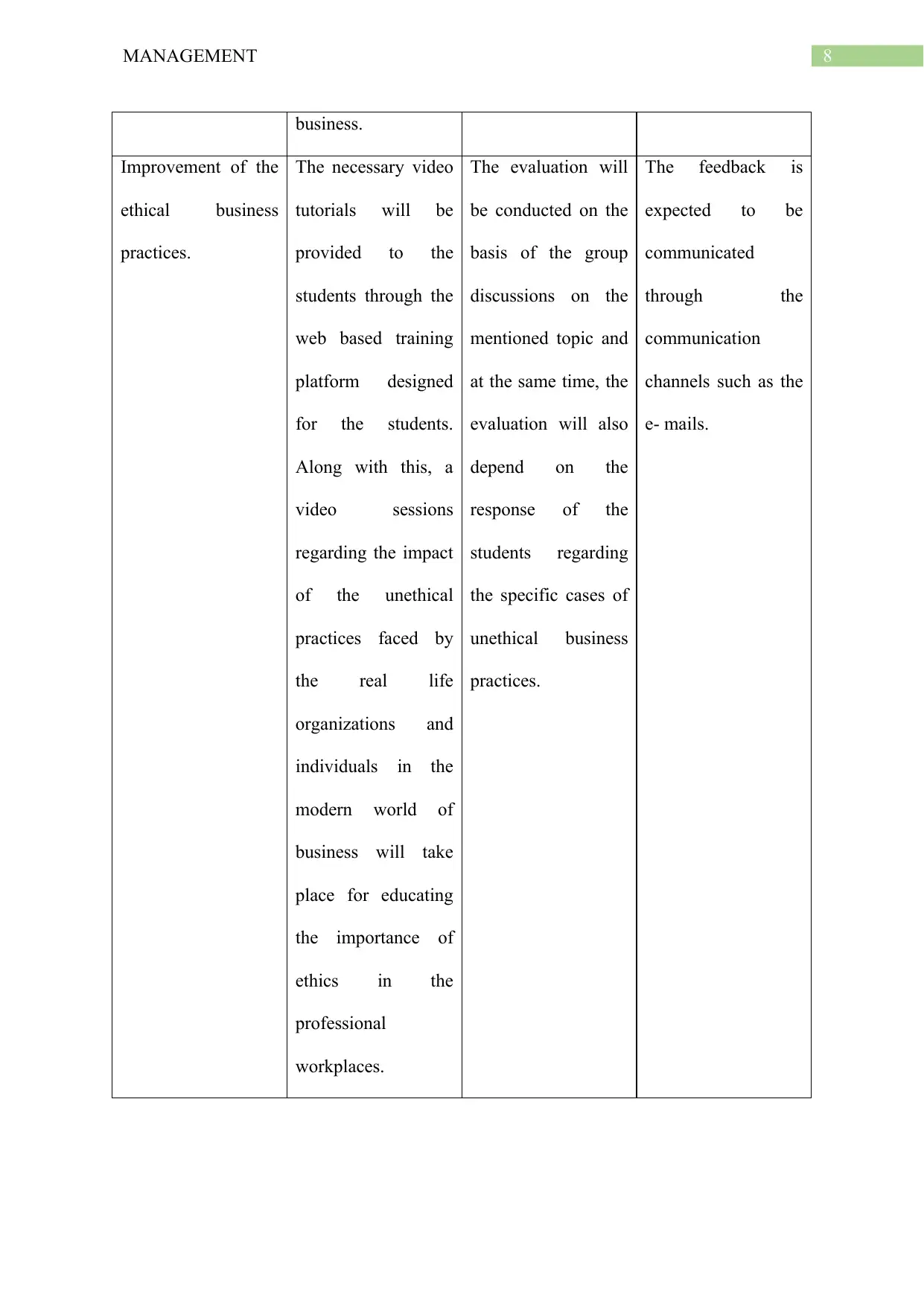
8MANAGEMENT
business.
Improvement of the
ethical business
practices.
The necessary video
tutorials will be
provided to the
students through the
web based training
platform designed
for the students.
Along with this, a
video sessions
regarding the impact
of the unethical
practices faced by
the real life
organizations and
individuals in the
modern world of
business will take
place for educating
the importance of
ethics in the
professional
workplaces.
The evaluation will
be conducted on the
basis of the group
discussions on the
mentioned topic and
at the same time, the
evaluation will also
depend on the
response of the
students regarding
the specific cases of
unethical business
practices.
The feedback is
expected to be
communicated
through the
communication
channels such as the
e- mails.
business.
Improvement of the
ethical business
practices.
The necessary video
tutorials will be
provided to the
students through the
web based training
platform designed
for the students.
Along with this, a
video sessions
regarding the impact
of the unethical
practices faced by
the real life
organizations and
individuals in the
modern world of
business will take
place for educating
the importance of
ethics in the
professional
workplaces.
The evaluation will
be conducted on the
basis of the group
discussions on the
mentioned topic and
at the same time, the
evaluation will also
depend on the
response of the
students regarding
the specific cases of
unethical business
practices.
The feedback is
expected to be
communicated
through the
communication
channels such as the
e- mails.
⊘ This is a preview!⊘
Do you want full access?
Subscribe today to unlock all pages.

Trusted by 1+ million students worldwide
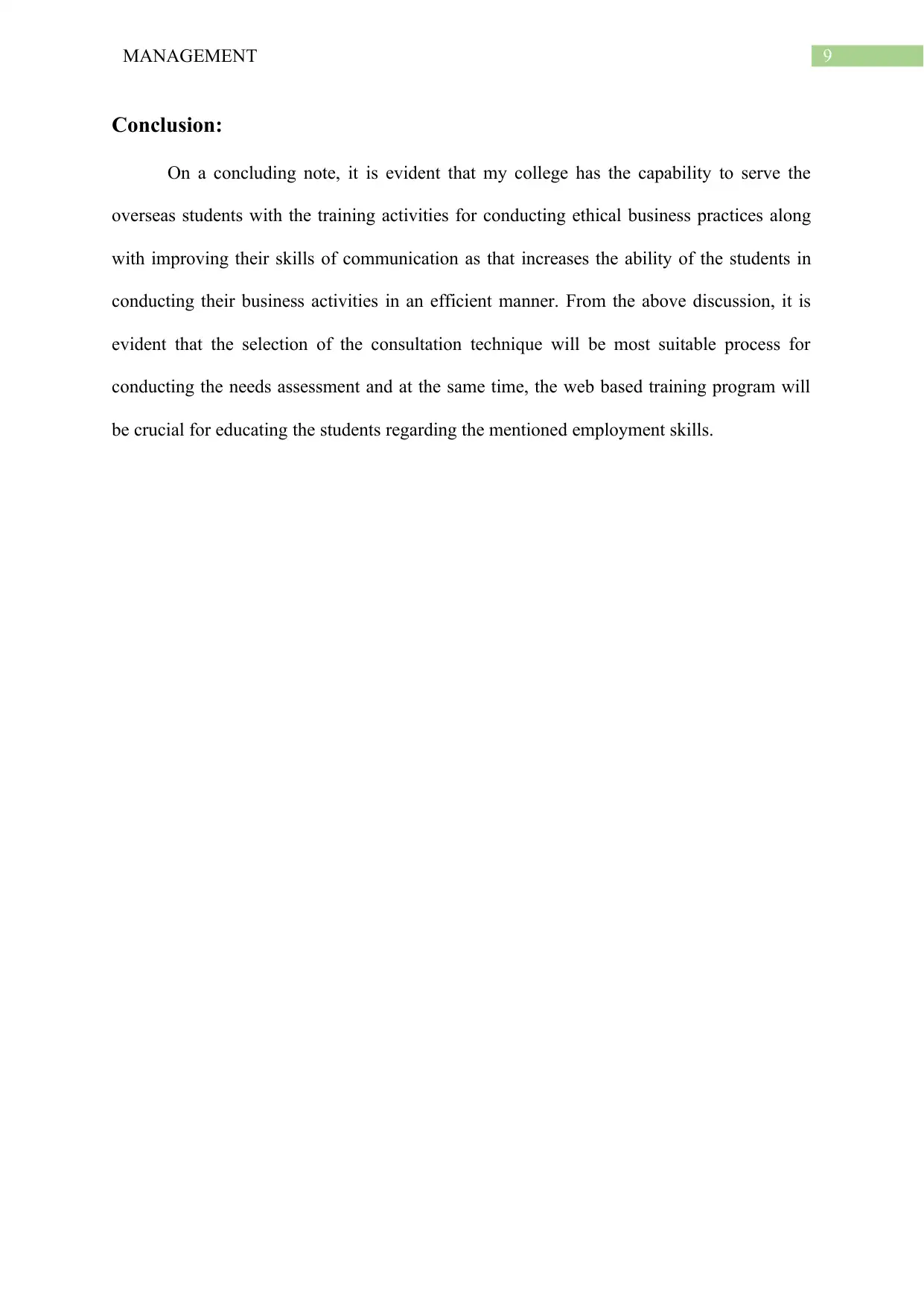
9MANAGEMENT
Conclusion:
On a concluding note, it is evident that my college has the capability to serve the
overseas students with the training activities for conducting ethical business practices along
with improving their skills of communication as that increases the ability of the students in
conducting their business activities in an efficient manner. From the above discussion, it is
evident that the selection of the consultation technique will be most suitable process for
conducting the needs assessment and at the same time, the web based training program will
be crucial for educating the students regarding the mentioned employment skills.
Conclusion:
On a concluding note, it is evident that my college has the capability to serve the
overseas students with the training activities for conducting ethical business practices along
with improving their skills of communication as that increases the ability of the students in
conducting their business activities in an efficient manner. From the above discussion, it is
evident that the selection of the consultation technique will be most suitable process for
conducting the needs assessment and at the same time, the web based training program will
be crucial for educating the students regarding the mentioned employment skills.
Paraphrase This Document
Need a fresh take? Get an instant paraphrase of this document with our AI Paraphraser
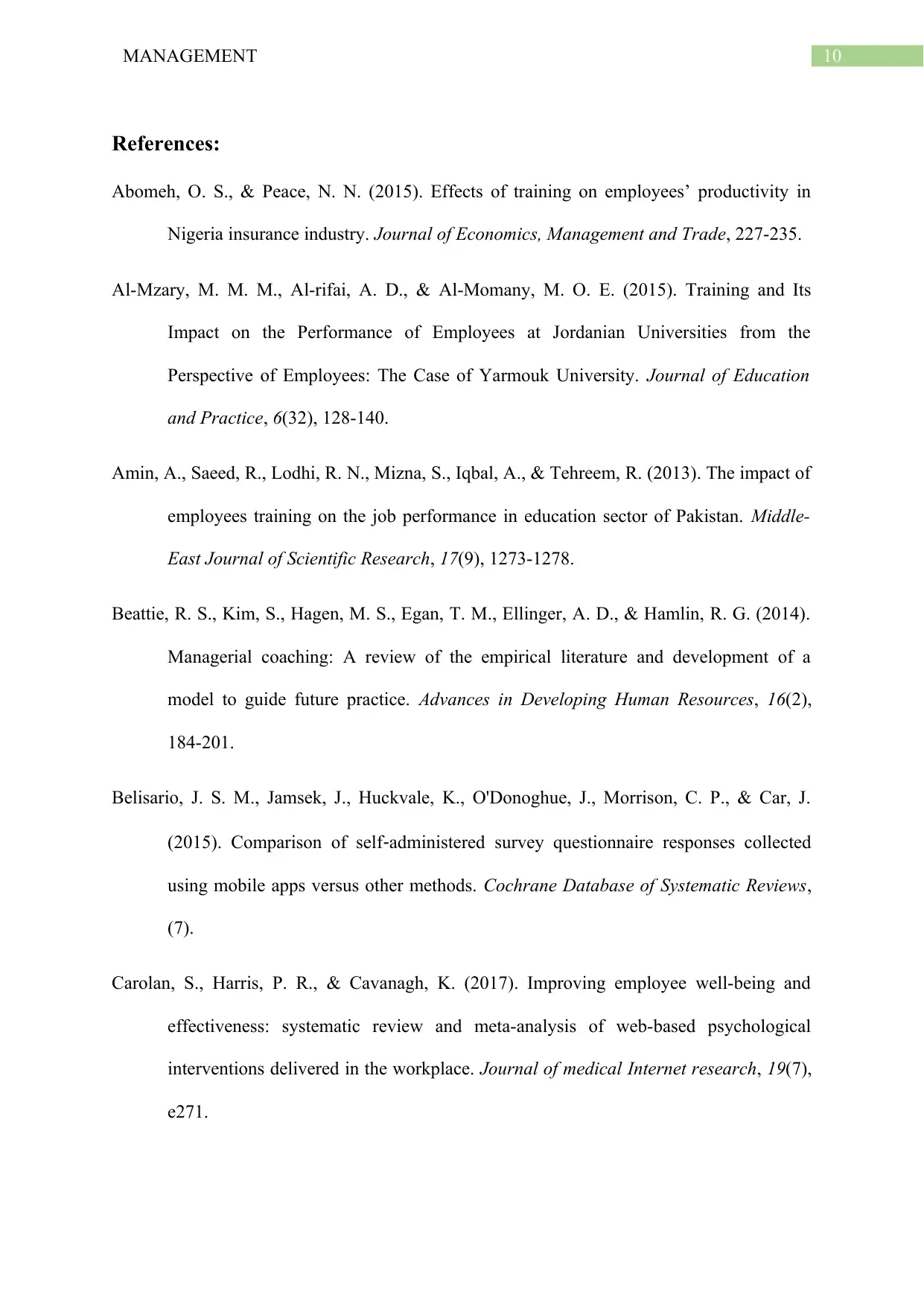
10MANAGEMENT
References:
Abomeh, O. S., & Peace, N. N. (2015). Effects of training on employees’ productivity in
Nigeria insurance industry. Journal of Economics, Management and Trade, 227-235.
Al-Mzary, M. M. M., Al-rifai, A. D., & Al-Momany, M. O. E. (2015). Training and Its
Impact on the Performance of Employees at Jordanian Universities from the
Perspective of Employees: The Case of Yarmouk University. Journal of Education
and Practice, 6(32), 128-140.
Amin, A., Saeed, R., Lodhi, R. N., Mizna, S., Iqbal, A., & Tehreem, R. (2013). The impact of
employees training on the job performance in education sector of Pakistan. Middle-
East Journal of Scientific Research, 17(9), 1273-1278.
Beattie, R. S., Kim, S., Hagen, M. S., Egan, T. M., Ellinger, A. D., & Hamlin, R. G. (2014).
Managerial coaching: A review of the empirical literature and development of a
model to guide future practice. Advances in Developing Human Resources, 16(2),
184-201.
Belisario, J. S. M., Jamsek, J., Huckvale, K., O'Donoghue, J., Morrison, C. P., & Car, J.
(2015). Comparison of self‐administered survey questionnaire responses collected
using mobile apps versus other methods. Cochrane Database of Systematic Reviews,
(7).
Carolan, S., Harris, P. R., & Cavanagh, K. (2017). Improving employee well-being and
effectiveness: systematic review and meta-analysis of web-based psychological
interventions delivered in the workplace. Journal of medical Internet research, 19(7),
e271.
References:
Abomeh, O. S., & Peace, N. N. (2015). Effects of training on employees’ productivity in
Nigeria insurance industry. Journal of Economics, Management and Trade, 227-235.
Al-Mzary, M. M. M., Al-rifai, A. D., & Al-Momany, M. O. E. (2015). Training and Its
Impact on the Performance of Employees at Jordanian Universities from the
Perspective of Employees: The Case of Yarmouk University. Journal of Education
and Practice, 6(32), 128-140.
Amin, A., Saeed, R., Lodhi, R. N., Mizna, S., Iqbal, A., & Tehreem, R. (2013). The impact of
employees training on the job performance in education sector of Pakistan. Middle-
East Journal of Scientific Research, 17(9), 1273-1278.
Beattie, R. S., Kim, S., Hagen, M. S., Egan, T. M., Ellinger, A. D., & Hamlin, R. G. (2014).
Managerial coaching: A review of the empirical literature and development of a
model to guide future practice. Advances in Developing Human Resources, 16(2),
184-201.
Belisario, J. S. M., Jamsek, J., Huckvale, K., O'Donoghue, J., Morrison, C. P., & Car, J.
(2015). Comparison of self‐administered survey questionnaire responses collected
using mobile apps versus other methods. Cochrane Database of Systematic Reviews,
(7).
Carolan, S., Harris, P. R., & Cavanagh, K. (2017). Improving employee well-being and
effectiveness: systematic review and meta-analysis of web-based psychological
interventions delivered in the workplace. Journal of medical Internet research, 19(7),
e271.
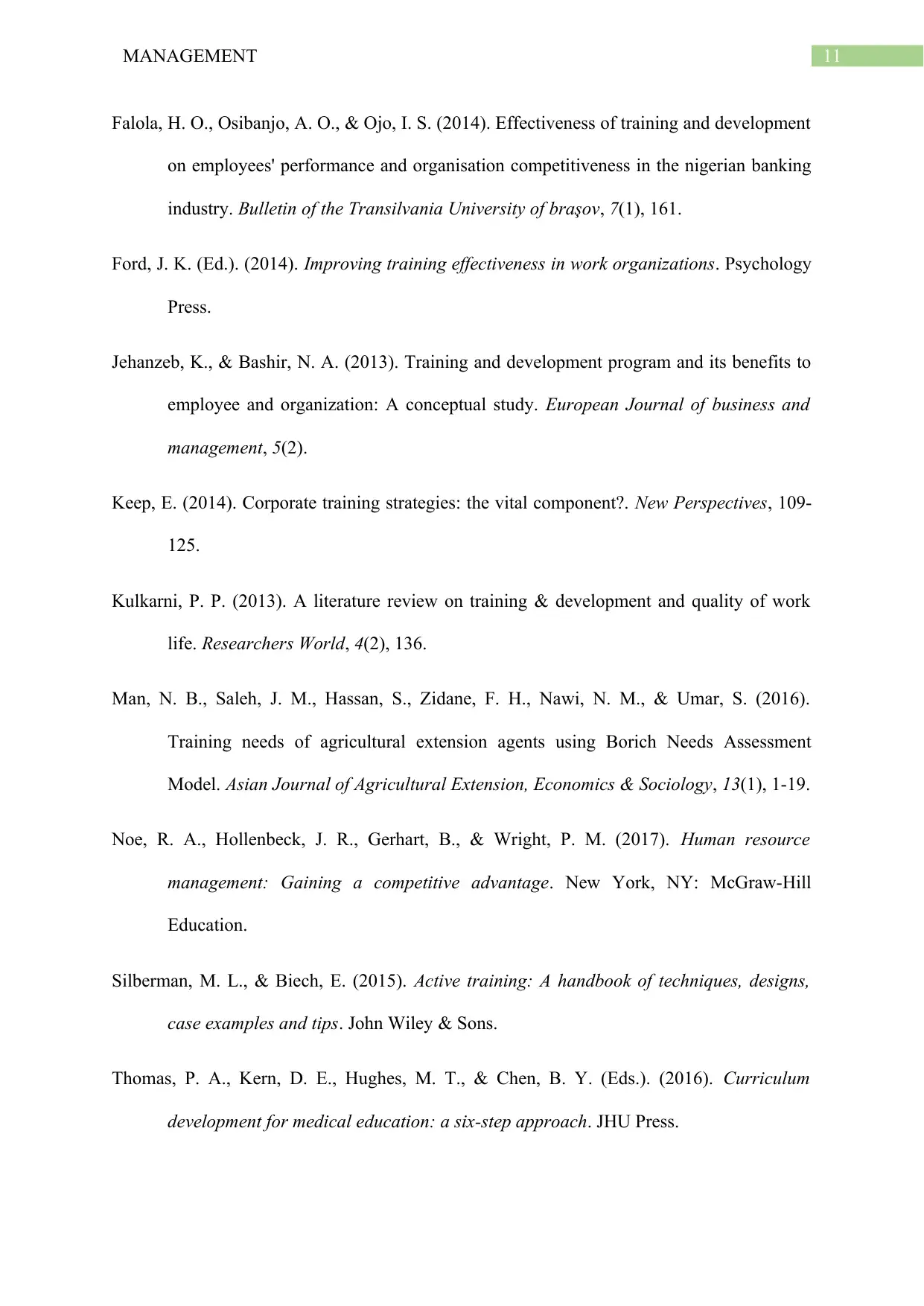
11MANAGEMENT
Falola, H. O., Osibanjo, A. O., & Ojo, I. S. (2014). Effectiveness of training and development
on employees' performance and organisation competitiveness in the nigerian banking
industry. Bulletin of the Transilvania University of braşov, 7(1), 161.
Ford, J. K. (Ed.). (2014). Improving training effectiveness in work organizations. Psychology
Press.
Jehanzeb, K., & Bashir, N. A. (2013). Training and development program and its benefits to
employee and organization: A conceptual study. European Journal of business and
management, 5(2).
Keep, E. (2014). Corporate training strategies: the vital component?. New Perspectives, 109-
125.
Kulkarni, P. P. (2013). A literature review on training & development and quality of work
life. Researchers World, 4(2), 136.
Man, N. B., Saleh, J. M., Hassan, S., Zidane, F. H., Nawi, N. M., & Umar, S. (2016).
Training needs of agricultural extension agents using Borich Needs Assessment
Model. Asian Journal of Agricultural Extension, Economics & Sociology, 13(1), 1-19.
Noe, R. A., Hollenbeck, J. R., Gerhart, B., & Wright, P. M. (2017). Human resource
management: Gaining a competitive advantage. New York, NY: McGraw-Hill
Education.
Silberman, M. L., & Biech, E. (2015). Active training: A handbook of techniques, designs,
case examples and tips. John Wiley & Sons.
Thomas, P. A., Kern, D. E., Hughes, M. T., & Chen, B. Y. (Eds.). (2016). Curriculum
development for medical education: a six-step approach. JHU Press.
Falola, H. O., Osibanjo, A. O., & Ojo, I. S. (2014). Effectiveness of training and development
on employees' performance and organisation competitiveness in the nigerian banking
industry. Bulletin of the Transilvania University of braşov, 7(1), 161.
Ford, J. K. (Ed.). (2014). Improving training effectiveness in work organizations. Psychology
Press.
Jehanzeb, K., & Bashir, N. A. (2013). Training and development program and its benefits to
employee and organization: A conceptual study. European Journal of business and
management, 5(2).
Keep, E. (2014). Corporate training strategies: the vital component?. New Perspectives, 109-
125.
Kulkarni, P. P. (2013). A literature review on training & development and quality of work
life. Researchers World, 4(2), 136.
Man, N. B., Saleh, J. M., Hassan, S., Zidane, F. H., Nawi, N. M., & Umar, S. (2016).
Training needs of agricultural extension agents using Borich Needs Assessment
Model. Asian Journal of Agricultural Extension, Economics & Sociology, 13(1), 1-19.
Noe, R. A., Hollenbeck, J. R., Gerhart, B., & Wright, P. M. (2017). Human resource
management: Gaining a competitive advantage. New York, NY: McGraw-Hill
Education.
Silberman, M. L., & Biech, E. (2015). Active training: A handbook of techniques, designs,
case examples and tips. John Wiley & Sons.
Thomas, P. A., Kern, D. E., Hughes, M. T., & Chen, B. Y. (Eds.). (2016). Curriculum
development for medical education: a six-step approach. JHU Press.
⊘ This is a preview!⊘
Do you want full access?
Subscribe today to unlock all pages.

Trusted by 1+ million students worldwide
1 out of 13
Related Documents
Your All-in-One AI-Powered Toolkit for Academic Success.
+13062052269
info@desklib.com
Available 24*7 on WhatsApp / Email
![[object Object]](/_next/static/media/star-bottom.7253800d.svg)
Unlock your academic potential
Copyright © 2020–2026 A2Z Services. All Rights Reserved. Developed and managed by ZUCOL.





